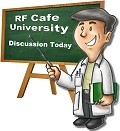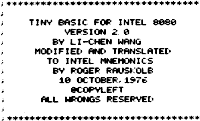You've Heard of a Copyright, But How About a Copyleft? |
|
1 | 2 | 3 | 4 | 5 | 6 | 7 | 8 | 9 | 10 | 11 | 12 | 13 | 14 | 15 | 16 | 17 | 18 | 19 | 20 | 21 | 22 | 23 | 24 | 25 | 26 | 27 | 28 | 29 | 30 | 31 | 32 | 33 | 34 | 35 | 36 | 37 A copyright, as you know, is legal protection against unauthorized usage or obvious modification of original creative works, something most people who generate valuable works like because it represents a right to private property. A copyleft, on the other hand, is an alternative which permits free distribution of original works with the only restriction being that it and/or derivative works also be declared copyleft material. Note how evil Capitalist companies like IBM, Artech House publishers, and Rohde & Schwarz copyright and patent everything they create in order to benefit financially from the work of their employees. Doing so allows them to provide good wages and benefits while creating useful goods and services for customers. Liberal-dominated companies like Google, Apple, and Facebook, by contrast, allow everything they create to be freely copied and/or modified by anyone. Their only concern is the welfare of fellow men. Oh, wait. The fact is those kinds of companies also copyright and patent everything they create. Benevolent distribution of freebies usually is only the mindset of people wanting access to stuff without earning it, and then they are usually the first to cry "foul" if someone else takes their stuff. You don't see wealthy movie stars, music artists, and sports figures opening their homes to street people or leaving their fleets of vehicles gassed (or charged) up at the side of the road for anyone to use. I have seen the copyleft logo in a few places when searching for freeware and shareware software and thought maybe it was just someone lampooning copyright protection, but upon further research I learn it is a very real form of protection for original works. Here is the distinction, in a nutshell (per Wikipedia entries):
Now when you spot a backwards copyright symbol, you know it is for real. As with copyrighted material, copylefted material is also subject to the "Fair Use Act." While on the subject of copyrights, content generated by Artificial Intelligence (AI) is not protected by copyright because the courts have decreed that copyright may only be assigned to humans. The following copyleft versus copyright thesis was generated at my request by ChatGPT. It can be considered to be copylefted, unlike the rest of this page content, which is copyrighted. - See Full List -Copyleft vs. Copyright Copyright and copyleft are two legal concepts that govern the use of creative works. Here is a brief comparison of the two: Copyright: Copyright is a legal right granted to the creator or owner of an original work, which includes literary, artistic, musical, and other creative works. Copyright law gives the creator exclusive rights to control the use and distribution of their work, and prohibits others from using or reproducing it without permission. The purpose of copyright is to protect the creator's economic interests in their work by providing them with a legal framework to control how their work is used and distributed. Copyright lasts for a limited period of time, after which the work enters the public domain and can be used freely by anyone. Copyleft: Copyleft is a legal concept that was developed as an alternative to copyright. The idea behind copyleft is to use copyright law to encourage the free distribution and modification of creative works, rather than restricting it. Copyleft licenses allow anyone to use, distribute, and modify a work, as long as the resulting work is also made available under the same copyleft license. This means that anyone who modifies a copyleft work must also make their modifications available under the same license, allowing the work to be continually shared and improved upon. The purpose of copyleft is to promote the free and open sharing of creative works, and to encourage collaboration and innovation. Copyleft licenses are often used in the development of open-source software and other creative works that benefit from community involvement and contribution. In summary, copyright and copyleft are two legal concepts that govern the use of creative works. Copyright gives the creator exclusive rights to control the use and distribution of their work, while copyleft allows anyone to use, distribute, and modify a work as long as the resulting work is also made available under the same license.
Posted March 8, 2023 |

 "
"